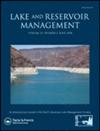明尼苏达州农业景观中一个浅湖的恢复——一种理解变化的跨学科方法
IF 0.8
4区 环境科学与生态学
Q2 Agricultural and Biological Sciences
引用次数: 0
摘要
【摘要】张建军,张建军,张建军,等。明尼苏达州农业景观中一个浅湖的恢复——一个跨学科的改变方法。湖泊保护区管理。XX: XXX-XXX。本研究以明尼苏达州绍卡坦湖为例,揭示了长期气候、水文、水化学和大型植物数据如何解释和预测浅湖相移。经过几十年的农业景观养分负荷,湖泊和流域管理工作成功地将夏季平均总磷和叶绿素a浓度降低到符合北部冰川平原生态区浅水湖泊专门设定的标准(分别为0.09 mg/L和0.03 mg/L)。该湖从浑浊的、浮游植物为主的阶段(大型植物的发生率<20%)“翻转”到清澈的、大型植物为主的阶段(年平均发生率为90%),明尼苏达州污染控制机构将其从该州的受损水域名单中删除。地下水和湖泊水质成对调查对于了解降水增加如何影响湖泊水质,地下水和地表水在该系统中的关系,以及氯化物和磷等化合物如何通过流域运输至关重要。整个湖的大型植物的出现已经持续了至少7年。虽然大量的大型植物生长有助于保持清澈的水状态,但它也可能造成休闲划船的问题。当湖泊使用者权衡这两个阶段的娱乐和审美差异时,湖泊管理人员质疑湖泊将在目前的清澈阶段保持多久。关键词:氯化物地下水长期监测大型植物监测水体营养损害浅湖管理致谢感谢MDNR和MPCA的众多工作人员进行了实地调查并协助进行了数据管理。我们感谢他们和我们各机构的领导认识到长期、多学科监测的价值。J. Lauer, S. Kloiber和E. Smith提供了对本文进行改进的评论和有益的意见。披露声明作者未报告潜在的利益冲突。本文章由计算机程序翻译,如有差异,请以英文原文为准。
The recovery of a shallow lake within an agricultural landscape of Minnesota—an interdisciplinary approach to understanding change
AbstractPerleberg DJ, Anderson JP, Streitz AR. 2023. The recovery of a shallow lake within an agricultural landscape of Minnesota—an interdisciplinary approach to change. Lake Reserv Manage. XX:XXX–XXX.This case study of Lake Shaokatan, Minnesota, reveals how long-term climate, hydrology, water chemistry, and macrophyte data can explain and predict shallow lake phase shifts. After decades of agricultural landscape nutrient loadings, lake and watershed management efforts successfully reduced summer mean total phosphorus and chlorophyll a concentrations to levels that met standards set specifically for shallow lakes in the Northern Glaciated Plains ecoregion (0.09 mg/L and 0.03 mg/L, respectively). The lake “flipped” from a turbid, phytoplankton-dominated phase (<20% macrophyte occurrence) to a clear, macrophyte-dominated phase (annual average of 90% occurrence), and the Minnesota Pollution Control Agency removed it from the state’s impaired waters list. A paired groundwater and lake water quality investigation was critical in understanding how increased precipitation might affect lake water quality, the relationship between groundwater and surface water in this system, and how compounds such as chloride and phosphorus are transported through the watershed. Lakewide macrophyte occurrence has been sustained for at least 7 yr. While abundant macrophyte growth helps maintain a clear water state, it can also create recreational boating issues. Lake managers question how long the lake will remain in the present clear phase as lake users weigh the recreational and aesthetic differences between the 2 phases.Keywords: Chloridegroundwaterlong-term monitoringmacrophyteMinnesotamonitoring wellsnutrient impairmentshallow lake management AcknowledgmentsWe are indebted to the numerous staff from MDNR and MPCA who conducted field surveys and assisted with data management. We thank them and our agencies’ leadership for recognizing the value of long-term, multidiscipline monitoring. J. Lauer, S. Kloiber, and E. Smith provided review and helpful comments that improved this article.Disclosure statementNo potential conflict of interest was reported by the author(s).
求助全文
通过发布文献求助,成功后即可免费获取论文全文。
去求助
来源期刊

Lake and Reservoir Management
Environmental Science-Water Science and Technology
CiteScore
3.30
自引率
6.70%
发文量
0
审稿时长
>36 weeks
期刊介绍:
Lake and Reservoir Management (LRM) publishes original, previously unpublished studies relevant to lake and reservoir management. Papers address the management of lakes and reservoirs, their watersheds and tributaries, along with the limnology and ecology needed for sound management of these systems. Case studies that advance the science of lake management or confirm important management concepts are appropriate as long as there is clearly described management significance. Papers on economic, social, regulatory and policy aspects of lake management are also welcome with appropriate supporting data and management implications. Literature syntheses and papers developing a conceptual foundation of lake and watershed ecology will be considered for publication, but there needs to be clear emphasis on management implications. Modeling papers will be considered where the model is properly verified but it is also highly preferable that management based on the model has been taken and results have been documented. Application of known models to yet another system without a clear advance in resultant management are unlikely to be accepted. Shorter notes that convey important early results of long-term studies or provide data relating to causative agents or management approaches that warrant further study are acceptable even if the story is not yet complete. All submissions are subject to peer review to assure relevance and reliability for management application.
 求助内容:
求助内容: 应助结果提醒方式:
应助结果提醒方式:


